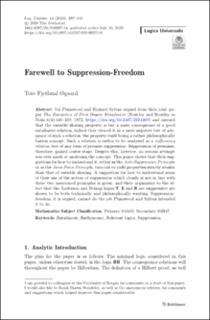Farewell to Suppression-Freedom
Journal article, Peer reviewed
Published version

Åpne
Permanent lenke
https://hdl.handle.net/11250/2739122Utgivelsesdato
2020Metadata
Vis full innførselSamlinger
- Department of Philosophy [240]
- Registrations from Cristin [9791]
Sammendrag
Val Plumwood and Richard Sylvan argued from their joint paper The Semantics of First Degree Entailment (Routley and Routley in Noûs 6(4):335–359, 1972, https://doi.org/10.2307/2214309) and onward that the variable sharing property is but a mere consequence of a good entailment relation, indeed they viewed it as a mere negative test of adequacy of such a relation, the property itself being a rather philosophically barren concept. Such a relation is rather to be analyzed as a sufficiency relation free of any form of premise suppression. Suppression of premises, therefore, gained center stage. Despite this, however, no serious attempt was ever made at analyzing the concept. This paper shows that their suggestions for how to understand it, either as the Anti-Suppression Principle or as the Joint Force Principle, turn out to yield properties strictly weaker than that of variable sharing. A suggestion for how to understand some of their use of the notion of suppression which clearly is not in line with these two mentioned principles is given, and their arguments to the effect that the Anderson and Belnap logics T, E and R are suppressive are shown to be both technically and philosophically wanting. Suppression-freedom, it is argued, cannot do the job Plumwood and Sylvan intended it to do.
